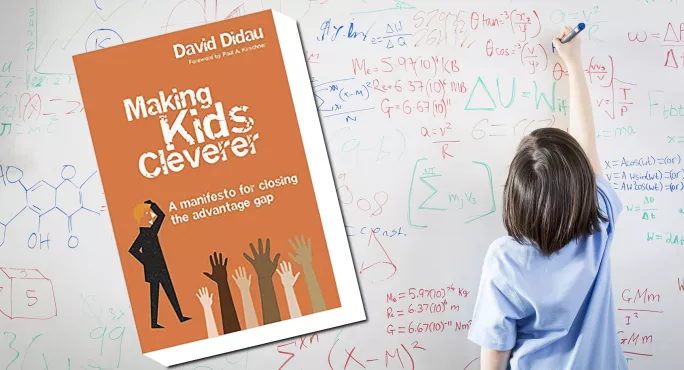- Home
- Book review: Making Kids Cleverer: A manifesto for closing the advantage gap
Book review: Making Kids Cleverer: A manifesto for closing the advantage gap

Making Kids Cleverer: A manifesto for closing the advantage gap
Author: David Didau
Publisher: Crown House Publishing
Details: 256pp, £14.99, paperback
ISBN: 978-1785833663
Parents around the world would all love to make their kids cleverer. Perhaps this is especially true of parents who have the intelligence, skill sets, know-how and resources to provide every advantage. And this is why David Didau argues that we must close the advantage gap, primarily through teaching kids knowledge, which in turn can help make them cleverer.
I could not agree more that closing the advantage or opportunity gap is important, especially for the cleverest but disadvantaged students in society - something Frank C Worrell and I wrote about in Tes.
For a book about education, Making Kids Cleverer is unusual because it engages with a wide range of the actual research evidence, and for this reason alone, it is worth taking seriously.
Didau does not immediately assume that education or external factors beyond student characteristics must be the solution, as so much of the education community does. Rather, he fully acknowledges the importance of intelligence and even of genetics, but also synthesises a wide range of solid research findings across numerous fields that pertain to education to conclude that improving intelligence or cleverness is really about imparting knowledge to children.
In this sense, the argument in the book is, at least in part, rather similar to what Dylan Wiliam espouses in Creating the Schools our Children Need or what ED Hirsch has detailed in his classic book Cultural Literacy. The main idea is that if students know things in their long-term memory, they have more tools at their fingertips to work with, and in that sense, they may have become “cleverer” or more “intelligent” in that they have learned something new.
The crux of Didau’s argument is the idea that intelligence is malleable. And though I agree that being cleverer could be verbally described as potentially having more knowledge in one’s mind, scholars in the field of intelligence - measured as general intelligence or g - have not actually agreed that intelligence is improvable or malleable. In fact, Richard Haier, the editor of the academic journal Intelligence and author of The Neuroscience of Intelligence, has noted that, at least to date, we do not know how to improve intelligence, though he does hope that we will in the future through ways that are as yet unimagined.
The Flynn effect - the strange rise in IQ scores over decades - is a scholarly subfield of study in which scholars are not sure whether such gains are on general intelligence. Additionally, John Protzko and Drew H Bailey have both examined the role of early intervention on improving intelligence and have found that any impact will “fade out” or go away. Yet, it is true that scholars such as Stephen Ceci, as well as Stuart Ritchie and Elliot Tucker-Drob, have conducted major synthetic studies suggesting that education is the most likely candidate for improving intelligence, though it again remains unclear exactly whether general intelligence itself is improved.
Another point that underpins Didau’s argument is the idea that the advantage gap can be closed through the imparting of knowledge. A general pattern typically found in individual differences research is that when you increase the mean of a distribution, you often also increase the variance of that distribution. What this means is well captured in Stephen Ceci and Paul Papierno’s classic article, “The rhetoric and reality of gap closing: when the ‘have nots’ gain but the ‘haves gain even more”. Closing the opportunity gap is important, and perhaps knowledge can narrow that gap, but when you impart knowledge to everyone at every level of society, it means everyone will get better, not just the most disadvantaged.
Despite these two main supports of Didau’s argument not being as strong as he might wish, Making Kids Cleverer does include reviews of literature that most academic scholars in education have yet to come to grips with. In particular, his review of the work of the late Judith Rich Harris - and the importance of peer culture in development - is valuable. As is his review of the work of Kathryn Asbury and Robert Plomin, co-authors of G is for Genes and Blueprint (by Plomin only). Near the end of the book, Didau gives a lot of decent practical recommendations of what can be done to help students through education in schools.
It is refreshing to read a book that starts with the most important variable that affects children in schools - intelligence - and consider that variable in the broader network of parents, peers, schools and wider society.
Many education researchers could learn from Didau, especially the way he takes research from across the spectrum seriously, struggles with it, and attempts to find a new but empirically supported path forward to help close the opportunity gap for children and improve their life outcomes.
This is the kind of book that just might initiate a real and difficult conversation among educators, parents and policymakers about what the research really shows and how we can use it to help children.
Jonathan Wai is assistant professor of education policy and psychology, and the 21st century endowed chair in education policy at the University of Arkansas, Fayetteville, US
Keep reading for just £1 per month
You've reached your limit of free articles this month. Subscribe for £1 per month for three months and get:
- Unlimited access to all Tes magazine content
- Exclusive subscriber-only stories
- Award-winning email newsletters